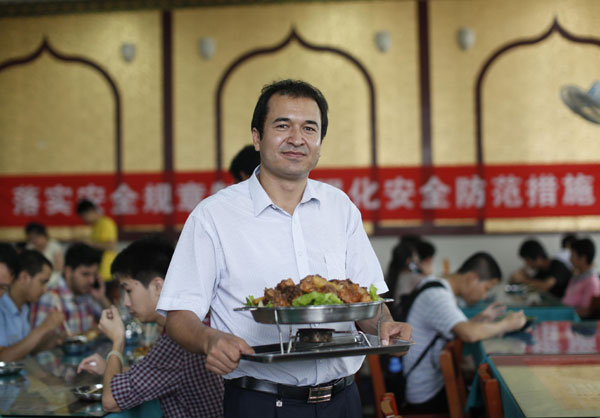 |
|
Kurbanjan Tewukel serves a chicken specialty at his halal restaurant in Wuhan University on Wednesday. Chen Zhuo / for China Daily |
"My business is small, but it is very meaningful," the Uygur student said.
Kurbanjan is owner and chairman of Tarim Halal Food Co in Wuhan, capital of Hubei province. His business has attracted a number of his relatives, neighbors and friends to work and live in the city.
"With the experiences of working and living in such a large and modern city, my hometown fellows have improved not only their own literacy, but also their children's education," Kurbanjan said.
Kurbanjan was born in Bayawat township in Kashgar of the Xinjiang Uygur autonomous region. He enrolled with high honors at Wuhan University in 1999 to study electrical engineering and automation.
At that time the school had only about 40 Uygur students out of a total enrollment of 40,000, and its halal restaurant provided just a few halal dishes for the students. Halal foods adhere to Islamic law's dietary practices.
"The students and I did not adapt to the diet and I discussed with some of my fellow Uygurs about opening a halal restaurant of our own when we were in grade four and had some spare time," Kurbanjan said.
With the support of Wuhan University, Kurbanjan invested 20,000 yuan ($3,200) to open his first halal restaurant at the university in 2005.
Due to a lack of experience, Kurbanjan suffered a deficit of 17,000 yuan in the first six months.
He then interned at another restaurant on campus and tried to learn about management from scratch.
Kurbanjan soon started to make money in his restaurant and expanded his halal catering to other universities and colleges in Wuhan, including Central China Normal University, Huazhong University of Science and Technology and Zhongnan University of Economics and Law.
In 2009, Kurbanjan established Wuhan Tarim Halal Food Co, which was the first halal food enterprise in the city catering especially to university students.
His restaurants are one of the students' favorite canteens on campus.
Bao Zhenyu, a first-year finance major from Qujing, Yunnan province, said he likes Kurbanjan's restaurant for its friendly environment, authentic Xinjiang food and reasonable price.
Ablikem, a sophomore majoring in electrical engineering, likes more than just the Xinjiang specialty dishes at Kurbanjan's restaurant. "Here, I can communicate in Uygur," he said.
So far, Kurbanjan provides halal food to more than 4,000 students and teachers from the Uygur, Hui and Salar ethnic groups.
"Now I have 180 employees, of whom half are from my hometown Xinjiang," said Kurbanjan.
One of Kurbanjan's employees said,"We met some difficulties in living and working at first, because we could not speak Mandarin very well." However, the employee added, "Our boss takes care of us like our parents."
Most of the employees are around 25 years old.
"I organized them to learn Mandarin during winter and summer vacations when our business was not so busy," said Kurbanjan.
Kurbanjan is currently continuing his postgraduate study of business management at Wuhan University.
His next plan is to build a Muslim food-processing plant to supply Wuhan's supermarkets.
Ma Lie contributed to this story.
liukun@chinadaily.com.cn
